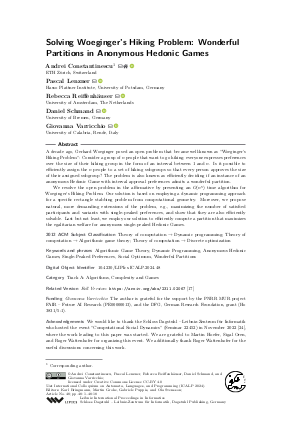@InProceedings{constantinescu_et_al:LIPIcs.ICALP.2024.48,
author = {Constantinescu, Andrei and Lenzner, Pascal and Reiffenh\"{a}user, Rebecca and Schmand, Daniel and Varricchio, Giovanna},
title = {{Solving Woeginger’s Hiking Problem: Wonderful Partitions in Anonymous Hedonic Games}},
booktitle = {51st International Colloquium on Automata, Languages, and Programming (ICALP 2024)},
pages = {48:1--48:18},
series = {Leibniz International Proceedings in Informatics (LIPIcs)},
ISBN = {978-3-95977-322-5},
ISSN = {1868-8969},
year = {2024},
volume = {297},
editor = {Bringmann, Karl and Grohe, Martin and Puppis, Gabriele and Svensson, Ola},
publisher = {Schloss Dagstuhl -- Leibniz-Zentrum f{\"u}r Informatik},
address = {Dagstuhl, Germany},
URL = {https://drops.dagstuhl.de/entities/document/10.4230/LIPIcs.ICALP.2024.48},
URN = {urn:nbn:de:0030-drops-201910},
doi = {10.4230/LIPIcs.ICALP.2024.48},
annote = {Keywords: Algorithmic Game Theory, Dynamic Programming, Anonymous Hedonic Games, Single-Peaked Preferences, Social Optimum, Wonderful Partitions}
}

 Creative Commons Attribution 4.0 International license
Creative Commons Attribution 4.0 International license

